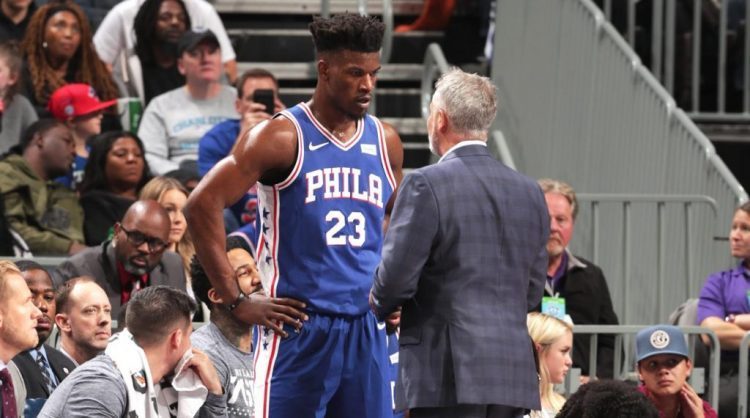 When some players challenge their teammates, have healthy discourse with their coach, want to win and push everyone to do their jobs they are labeled as fiery competitors. When others do it, they are labeled as a cancer and a bad teammate. For some odd reason, Jimmy Butler is falling into the category of the latter. He said that the young players in Chicago didn’t work hard enough and was considered a problem and traded. He said the young players in Minnesota didn’t take basketball seriously enough, didn’t play hard enough and didn’t put the work in to maximize their potential. When he spoke up, the organization sided with the players he was speaking against. He asked to be traded and they initially refused. I would like to know how he was wrong in either situation.
When some players challenge their teammates, have healthy discourse with their coach, want to win and push everyone to do their jobs they are labeled as fiery competitors. When others do it, they are labeled as a cancer and a bad teammate. For some odd reason, Jimmy Butler is falling into the category of the latter. He said that the young players in Chicago didn’t work hard enough and was considered a problem and traded. He said the young players in Minnesota didn’t take basketball seriously enough, didn’t play hard enough and didn’t put the work in to maximize their potential. When he spoke up, the organization sided with the players he was speaking against. He asked to be traded and they initially refused. I would like to know how he was wrong in either situation.
If I’m not mistaken, he was the best player and considered the team leader on both of those squads. Who else should have been speaking up on these issues? People often let personal feelings and public perception impact how they view certain players. Honestly to boil this down to a single notion, most people feel like only players that have won championships are allowed to be vocal, outspoken and blunt. But you need a player who is vocal about the right things to build a championship culture. And it’s not like Jimmy is just some guy. His production speaks for itself. I’m not exactly sure why you wouldn’t want this type of guy around your team. If he’s a cancer then that’s the only cancer on Earth I want to spread. Honesty, straight forwardness and having tough conversations are frowned upon. If you’re waiting for a player to win a championship before you are willing to accept these things from them you will be waiting forever. Or you will be repeatedly shuffling the deck hoping to get lucky. You will never build a winning culture in an environment that’s void of these things.
Jimmy Butler is not a player for today’s league. And I don’t mean that as a detriment. He’s a throwback player, a man trying to lead men. You can’t lead men by being passive and docile. You have to have the courage to say the things that no one else wants to say. When a leader sees something that’s preventing the collective from achieving their common goal, it is his responsibility to address it. It’s not always going to sound pretty and pleasant. Comfort does not bring about change. Jimmy makes people uncomfortable. And that’s why he’s seen as dangerous and problematic.
What’s funniest about this is no coach has ever said they had an issue with how Jimmy operates. He and Fred Hoiberg had a good relationship. Of course some rough conversations were had but Hoiberg stated that they had a very open line of communications and there was no hostility between them. In Minnesota, Thibs already knew what to expect and even fought to keep him on the team until the bitter end despite Jimmy’s desire to play elsewhere. I feel like it’s no coincidence that Thibodeau is removed shortly after Butler’s departure but that’s another story for another day. And even now in this current situation with the Sixers, Brett Brown says he has no issues with Jimmy and how he approaches things. They speak everyday and are on the same page in regards to the direction of the team. Somehow, a film session after an embarrassing loss where Jimmy spoke up on some issues plaguing the teams performance has turned into Jimmy creating turmoil within the organization. Philly is considered a team on the cusp but not exactly a championship contender. Butler sees some things that can help get them over the edge. He spoke up about it. Why this is considered a problem is beyond me. Embiid publicly came out and said he isn’t happy with his role and the amount of touches he gets and he wasn’t vilified. Butler has never expressed a selfish or personal agenda. Everything he has been vocal about was focused on the betterment of the team. Yet somehow, someway people perceive him as the problem. Says a lot about the culture of the league. I guess a room full of sheep would get uptight if a lion walked in and started roaring.
